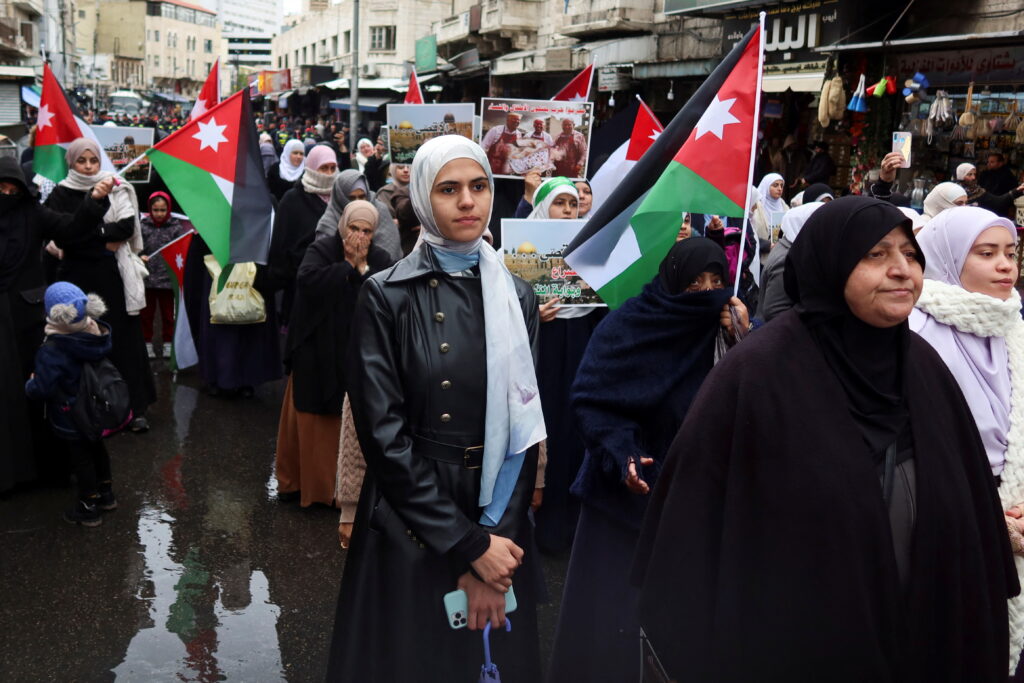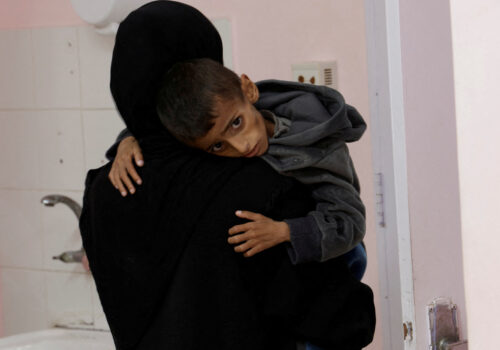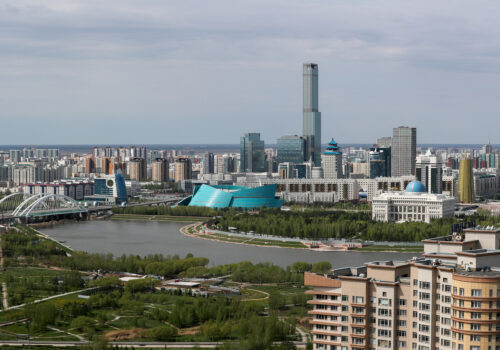Jordan-Israel security cooperation continues quietly but unabated
In the almost two years since the October 7, 2023 Hamas attack and launch of Israel’s war in Gaza, Jordan has made several diplomatic moves that could indicate their relationship with Israel is in trouble: Pulling out of a joint water-for-energy deal with the United Arab Emirates (UAE) and Israel in November 2023, recalling Amman’s ambassador from Israel, voting to expel the Israeli ambassador to Jordan in May 2024, and calling for a weapons embargo on Israel, to name a few.
And since the collapse of the January 2025 ceasefire between Israel and Hamas, Jordanian officials like King Abdullah II and Foreign Minister Ayman Safadi have issued several inflammatory comments about Israel and rejected suggestions to relocate Palestinians from Gaza to neighboring countries.
Yet, on a military and intelligence level, cooperation continues to thrive. In April 2024, Jordan, in coordination with the United States, assisted in the downing of many of the more than three hundred missiles and drones that Iran and its proxies launched at targets in Israel. French Rafale fighter jets also intercepted some of those weapons at Amman’s request. This support came amid reports from an Iranian Revolutionary Guard Corps (IRGC)-linked news agency that Iran had threatened Jordan that it would become a target if it cooperated with Israel again.
Two months later, Jordan—along with officials from Bahrain, the United Arab Emirates, Saudi Arabia, and Egypt—met in Manama with Israeli Defense Forces (IDF) Chief of Staff General Hertzi Halevi and United States Central Command (CENTCOM) Commander General Michael Erik Kurilla to discuss regional security cooperation. Israeli and Jordanian officials have continued to meet secretly to discuss shared security concerns, including the fallout of the ousting of Bashar al-Assad in Syria and Israel’s ensuing military campaign there.
Continued imperative for cooperation
Amman has calculated that diplomatic moves such as withdrawing from the water-for-energy deal will help to appease its population—more than 50 percent of which identifies as Palestinian—without fundamentally altering Jordan’s longstanding security arrangement with Israel.
Israel-Jordan relations long predate the signing of the Jordan-Israel Peace Treaty in 1994, but the dynamic has especially evolved in the years since that normalization. That includes intelligence sharing, security assistance, and even some weapon deliveries—like Israel’s 2015 transfer to Jordan of sixteen decommissioned AH-1 Cobra helicopter gunships, aimed at bolstering the Kingdom’s capacity to fight the Islamic State (ISIS) and other insurgents from neighboring Iraq and Syria. The relationship also has benefits outside of the military and security realm, with Israel giving Jordan access to more than one hundred million cubic meters of water per year and a substantial amount of natural gas. Additionally, Jordan’s cooperation is viewed as a critical motivator for the United States to provide the small Arab country with $1.45 billion annually in aid.
At the same time, Jordan’s relationship with Israel is crucial in its efforts to curb rising Iranian influence in the country, which has been escalating over the past year and a half. Iran-backed militias in Iraq and Yemen have repeatedly violated Jordanian airspace to launch drone attacks on Israel, and there have been several instances of US and Jordanian authorities thwarting Iranian attempts to smuggle arms into the country. Those weapons shipments have included Claymore mines, C4 and Semtex explosives, Kalashnikov rifles, and 107mm Katyusha rockets, with at least some of them destined for the West Bank, according to reports from Jordanian sources.
SIGN UP FOR THIS WEEK IN THE MIDEAST NEWSLETTER
The frequent gun and drug smuggling has become such a concern for the Israeli government that in May, it approved a five-year $1.4 billion plan to secure the border with Jordan that would include increased IDF presence in the area, and a 425-kilometer high-tech border fence that would run from Hamat Gader in Israel’s north to the Samar Sands, north of Eilat. In Israel’s official statement about the plan, they cited that it comes in response to the heightened number of infiltrations and weapons smuggling from the border.
The issue of Iranian presence in Jordan could soon balloon. Tehran could see the Jordanian government’s recent decision to declare the Muslim Brotherhood—and even the promotion of its ideology—illegal as a prime opportunity to expand its foothold in the country and possibly offset some of its losses from the decimation of Hamas’ military capabilities and leadership, the elimination of top Hezbollah military and political leaders, including longtime Hezbollah Secretary General Hassan Nasrallah, and the overthrow of the Assad regime in Syria. Even prior to the decision, reports indicated that Iran was trying to recruit young, radicalized members of Jordan’s Muslim Brotherhood. This was evidenced in May 2024 by Jordanian authorities foiling a plot to smuggle weapons from Iran-backed militias in Syria to a Jordanian Muslim Brotherhood for use in undisclosed acts of sabotage and a statement in April 2024 made by the Iran-backed Kataib Hezbollah that the group intends to supply twelve thousand Jordanians with rockets and explosives to fight against Israel.
Even with all these threats, Jordanian leadership recognizes that widespread domestic unrest over Amman being seen as too supportive of Israel could ignite existing discontent over the struggling Jordanian economy and several unpopular socio-economic policies, potentially leading to an uprising. Fears of such an outcome are particularly raw, given accusations in 2021 that King Abdullah II’s younger brother, popular former Crown Prince Hamzah bin Hussein, was involved in a potential effort to overthrow the government.

The King knows that he must balance the important security and economic support he receives from Jerusalem with mounting domestic pressure to sever relations. However, maintaining this partnership will only get more difficult if the war in Gaza drags on and potentially escalates, which seems likely after Israel’s security cabinet approved a new comprehensive plan on May 5th to intensify its offensive against Hamas and occupy Gaza.
Policy recommendations
To preserve and even deepen the Israeli-Jordanian partnership in this volatile context, both sides should pursue cooperation that is largely out of the public eye but still provides strategic value.
For example, while Jordan waits for its long-requested Patriot missile batteries from the United States, Israel could quietly augment Jordanian air defenses by deploying an Iron Dome or even an Arrow 3 system near the Israel-Jordan border. The move would provide critical coverage from Iranian-backed drone and missile threats over joint Israel-Jordan airspace while also avoiding triggering the domestic backlash that would come with these systems being deployed within Jordanian territory.
Second, both countries should formalize intelligence coordination in areas of counter-smuggling, cyber defense, and early-warning capabilities. Such cooperation could mean establishing joint intelligence cells or data-sharing platforms where Israeli, Jordanian, and American officials can share information and insights in real time, allowing them to better anticipate and respond to security threats.
Third, both countries should build on Jordan’s role in the existing Israel-Gulf land bridge, a land route between the Gulf and Israel’s seaports meant to allow for exporting goods from Asia to Europe via Israel, by expanding infrastructure and regulatory coordination. To reduce the blowback from such projects, which are inherently more visible and politically sensitive, they should be integrated into broader multilateral initiatives like the India-Middle East-Europe Economic Corridor (IMEC) or a regional railway network. These projects could significantly strengthen Jordan’s struggling economy, which would in turn help the government manage mounting domestic pressure and increase the durability of its partnerships in the region.
Finally, Israel and Jordan could work to revive the Israel-Jordan-UAE water-for-energy deal by involving other parties like the European Union, United Nations, or World Bank. Involving multilateral actors could help dilute the public perception of direct Israeli involvement, thereby easing domestic political sensitivities in Amman and increasing the deal’s viability. These steps would not only enhance regional stability and strengthen the existing Israel-Jordan relationship but also help King Abdullah II navigate mounting domestic unrest, economic strain, and regional security threats in an increasingly volatile Middle East.
Emily Milliken is the associate director of media and communications for the N7 Initiative at the Atlantic Council’s Middle East Programs.
Further reading
Thu, May 22, 2025
Lebanon’s 1982 war reverberates in Israel’s Syria campaign
MENASource By Sinan Hatahet
Israel's ongoing intervention in Syria appears different from its 1982 invasion of Lebanon—but beneath the surface, parallels are striking.
Mon, May 12, 2025
Gazans fear famine amid Israel aid block: ‘I don’t want to be a number’
MENASource By Arwa Damon
For Palestinians, time is running out— a warning that has been echoed at some of the highest ranks of international organizations, including the World Health Organization.
Mon, May 12, 2025
Azerbaijan and Kazakhstan are the Abraham Accords’ new frontier
MENASource By
Joining the Accords could benefit Baku and Astana, while also helping Israel and the US strengthen engagement with the Turkic world.
Image: Jordanian King, Abdullah II, attends a military exercise by the Jordanian Armed Forces Jordanian King, Abdullah II, attends a military exercise by the Jordanian Armed Forces, the General Intelligence Department, and the Public Security Directorate at the Special Police Training Center in Amman, Jordan. Royal Hashemite Court apaimages Amman Amman Jordan 180525_JORDAN_JPO_001 Copyright: xapaimagesxRoyalxHashemitexCourtxxapaimagesxNo Use Switzerland. No Use Germany. No Use Japan. No Use Austria


